The 2004 Summer Concert Series
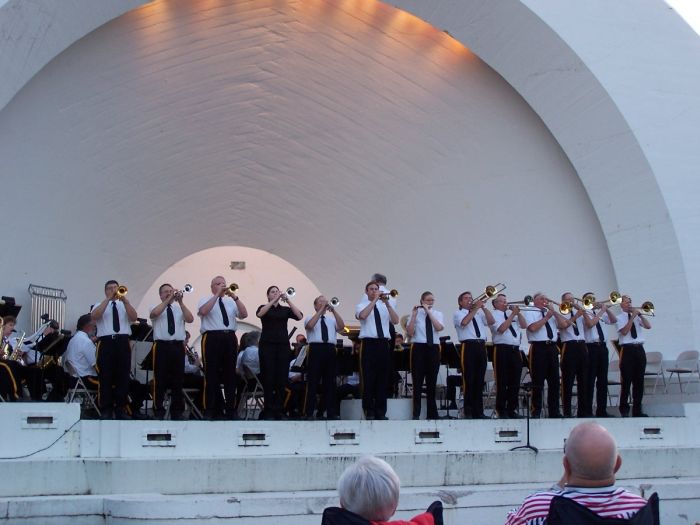
The 2004 Summer Concert Series

June 6
The Karl L. King Municipal Band of Fort Dodge, IA, began their 2004 summer season on Sunday evening, June 6, at the Karl King Bandshell in Oleson Park. The opening concert of the season included music in keeping with the Frontier Days celebration in Fort Dodge. Marches were the main part of this first concert. Performed were Yellowstone Trail and Gallant Zouaves, both written by the bandís namesake, Karl L. King, along with John Klohrís fine march, The Billboard, and John Philip Sousaís classic, The Black Horse Troop. Other Karl L. King selections included the circus favorite Homestretch Galop, along with a touch of ragtime with Kentucky Sunrise and a collection of three songs written for Colonel William F. ďBuffalo BillĒ Codyís Wild West Shows, including Wyoming Days, On The Warpath, and Passing Of The Red Man.
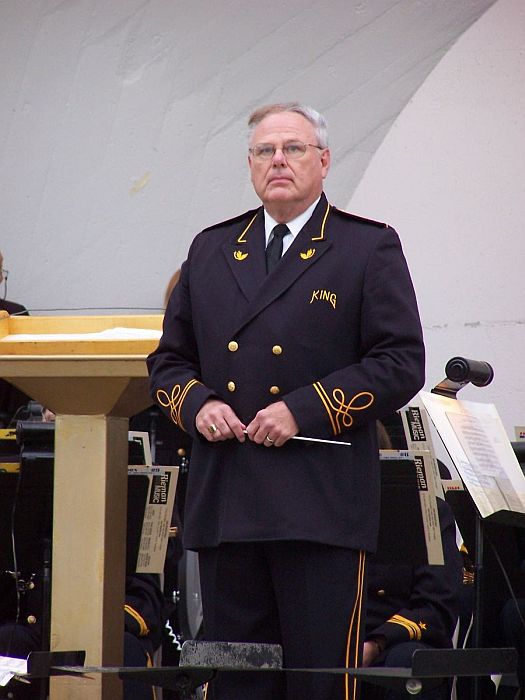
Jerrold Jimmerson, conductor
Karl L. King Municipal Band of Fort Dodge, Iowa
The overture was William Tell, written by the Italian opera composer, Gioacchino Rossini. This overture has proven to be the best of its kind and is one of the most popular in the entire range of orchestral literature.
On the lighter side was music arranged by Robert Hawkins from the epic motion picture, How The West Was Won; and a medley of early folk songs, entitled Second American Folk Rhapsody by Clare Grundman. In addition, the trombone section was featured on Fred Jewellís composition, Trombone Blues.
The concert closed in the traditional way, with the playing of our National Anthem, The Star-spangled Banner.
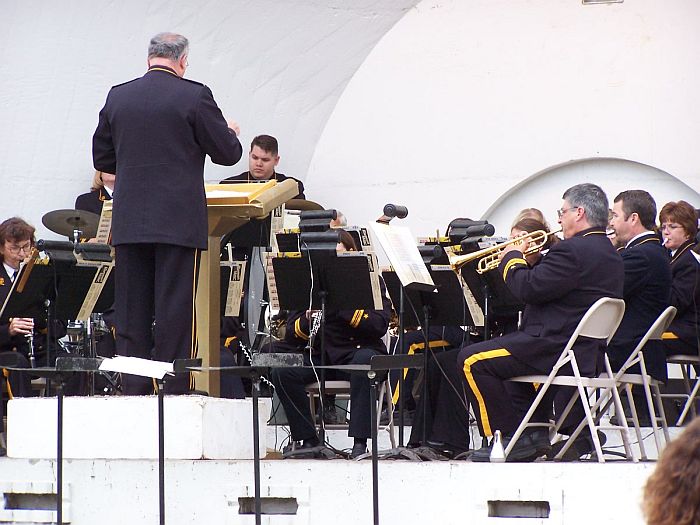
June 13
The second summer concert featured patriotic music in observance of the Flag Day Holiday. Marches included on the program were Emblem Of Freedom by Karl L. King, National Emblem by E. E. Bagley, and 133rd Infantry Iowa National Guard by William Laurier. Closing the concert was everyoneís favorite, The Stars and Stripes Forever, by John Philip Sousa.
Music from all five branches of the military were played during the Armed Forces Salute medley, and audience members and/or their families were invited to stand in recognition of military service. Other patriotic selections performed included George M. Cohan Patriotic Fantasy; Sousaís composition, Fugue On Yankee Doodle; and God Shed His Grace On Thee by Andrew Glover.
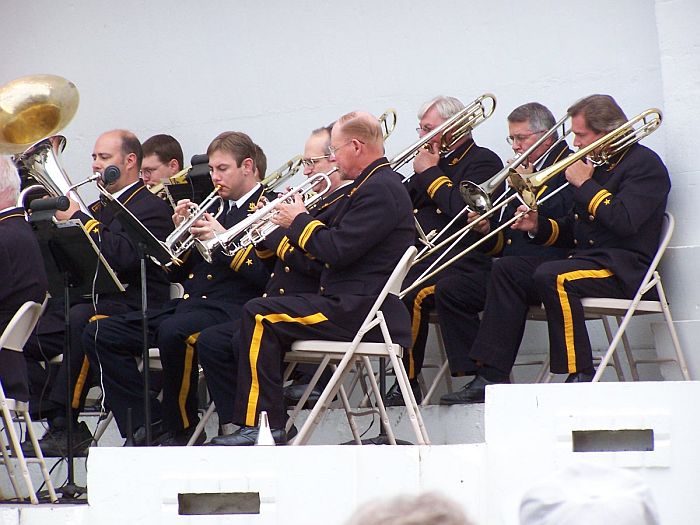
Two special features highlighted this concert. First, Conductor Jimmerson narrated a tribute to the American Flag during the playing of the James Swearingen composition, Lest We Forget. John McCartney on the Alto Saxophone was featured playing the popular Gershwin song, Someone To Watch Over Me. Mr. McCartney lives in Fort Dodge, and is retired as Director of Bands at Iowa Central Community College. He currently works in real estate.
As a tribute to all World War II veterans, and in recognition of the new monument recently dedicated in Washington, D.C., the band offered a medley of songs that were popular during the early 1940ís. This medley, arranged by James Christensen, is entitled The Homefront: Musical Memories of World War II. The audience was encouraged to bring small flags they were invited to wave these during the evening to make this Flag Day Concert even more impressive. In addition, flags were passed out to audience members, courtesy of the efforts of George Mack and donations from several local businesses. This special Flag Day concert closed with our National Anthem, The Star-spangled Banner.
June 20
True to the bandís tradition and heritage, this concert featured several marches, including Invictus, and Neddermeyer Triumphal, along with the circus galop, Royal Hippodrome, all written by Karl King. Also on the program were the circus march, Colossus Of Columbia, by Russell Alexander, and His Honor, by Henry Fillmore. This latter selection was performed to honor all fathers in attendance on Fatherís Day.
Other selections included were the overture to the opera, William Tell, by the Italian composer Gioacchino Rossini, along with March and Procession of Bacchus by the French composer Leo Delibes. In addition, a collection of several Karl King songs, entitled Melody ala King, as arranged by Harry Alford, were performed. This medley included an appropriate selection for the evening, A Night In June.
Lighter sounds included a Dixieland Combo out front with the Band accompanying on a medley of songs entitled Dixieland On Stage. Included in this medley were Royal Garden Blues, Do You Know What It Means To Miss New Orleans, and When The Saints Go Marching In.
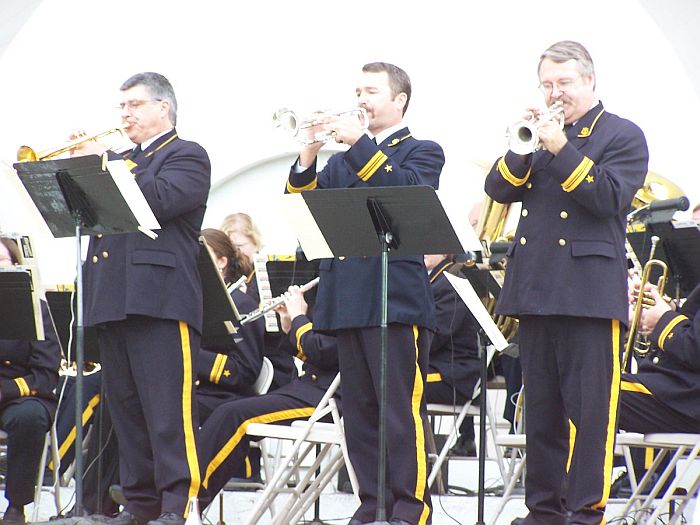
Adding to the program in this evening's concert was a rendition of Bugler's Holiday performed by three trumpet players from within the band. Show performing above are Jim Perkins, Tim Miller, and David Swaroff. The same trio also performed Carnival Variations.
June 27
This concert highlighted several different styles of Band music.
If classical band works were among your favorites, then you enjoyed the
Marriage
of Figaro Overture by the Austrian composer, Wolfgang Amadeus Mozart;
and Elsaís Procession To The Cathedral from the opera Lohengrin
by the German composer, Richard Wagner.
Well known popular selections were also heard, and they included
Big
Bands In Concert, a medley of several songs made popular in the 1940ís
by such groups as Glenn Miller, Duke Ellington, or Sy Oliver. The
band performed Rush Street Tarantella, by Paul Yoder, which is named
after the famous street in Chicago.
Marches are always popular, and there were plenty on this concert
to enjoy, including Alhambra Grotto and The Goldman Band
by Karl L. King, the Royal Bridesmaid by John Casto, and Quality
Plus by Fred Jewell.
Other Karl King selections on the program were the beautiful aerial
waltz entitled June Twilight along with The Big Cage Galop.
Special guest vocal soloists for this concert were Shari and Roger Netz from Manson. Both are graduates of Manson High School, and have performed with the Manson Meridian Singers, the Ralph Scott Orchestra, and the LD Three Show. Shari works as a legal secretary in Rockwell City, while her husband Roger is a vocal music instructor in the Manson Northwest Webster Community Schools. Shari performed the popular standard by Rodgers and Hart entitled Blue Moon, then was joined by Roger as they sang together on Gershwinís classic, They Canít Take That Away From Me.
The Star-spangled Banner by Francis Scott Key closed the concert.
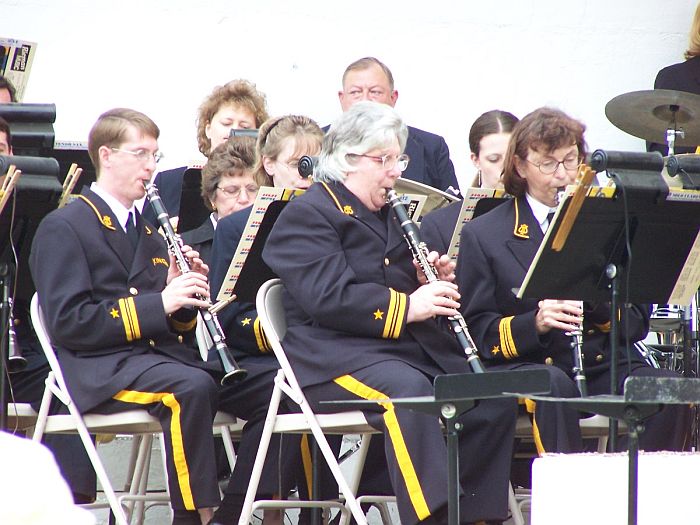
July 4
The Karl L. King Municipal Band of Fort Dodge had a special concert planned for July 4th as a musical tribute to our nationís holiday observance. Many selections had a patriotic flavor, as one might have expected. Songs heard included Morton Gouldís classic American Salute, an arrangement of songs popular during World War I entitled Over There Fantasie, Carmen Dragonís inspiring arrangement of America The Beautiful, and a new arrangement of the Navy Hymn done by Andrew Glover entitled Those In Peril On The Sea.
Marches were the order of the day, and included Americans We by Henry Fillmore, Sons Of Veterans by Karl L. King, along with The Liberty Bell and The Stars and Stripes Forever, both composed by John Philip Sousa.
download a video excerpt of Sons of Veterans (8.5 MB .mov)
On the lighter side was a medley of songs made famous by bandleader Glenn Miller, which included The American Patrol and Tuxedo Junction among other favorites.
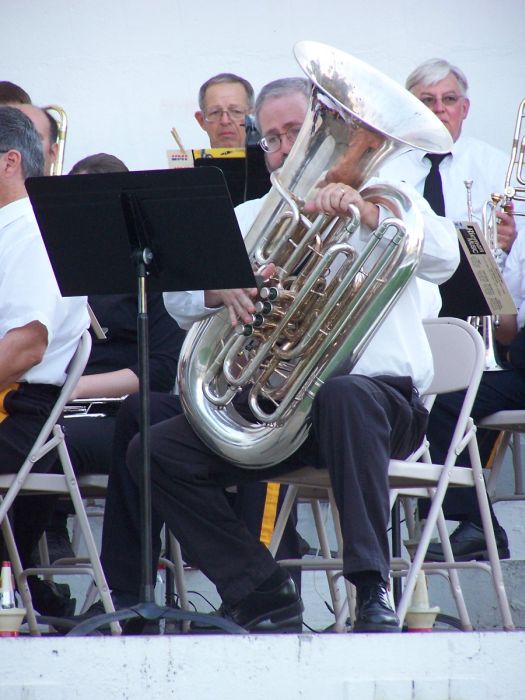
Michael Short was the special guest tuba soloist for this concert. Mike was born and raised in Fort Dodge, graduating from Senior High. He began playing tuba in the King Band during his junior year in High School, and was the first recipient of the Karl L. King Scholarship. He attended the University of Northern Iowa, earning both his BA and MA degrees in tuba performance. Mike spent 10 years in the Chicago area, and studied with Arnold Jacobs, who is know throughout the world as a fine brass teacher and also for his 44 years of performing with the Chicago Symphony. After moving back to Des Moines, Mike now performs in a wide variety of music venues throughout Iowa. He is the Principal Tuba with the Waterloo-Cedar Falls Symphony, the Des Moines Metro Opera and the Des Moines Symphony Brass Quintet, and Acting Principal Tuba with the Cedar Rapids Symphony. His teaching duties presently include positions as Teaching Artist of Low Brass at Drake University and Simpson College, as well as maintaining a private teaching studio. He and his wife, who is a Euphonium player, perform with the Tuba Quartet, Undertow.
Mike performed two selections on the tuba. First was the classic solo, Old Home Down On The Farm, followed by Karl L. Kingís humoreske, The Devil And The Deep Blue Sea.
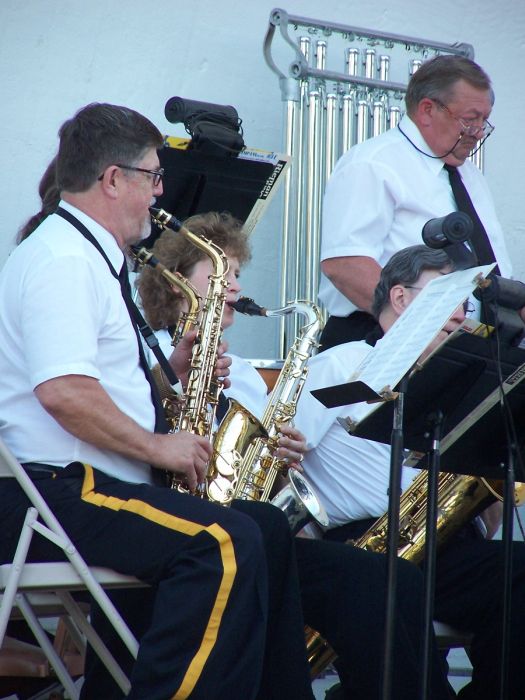
This Sunday's concert promised to provide just the right mix of standard band works along with marches and other popular favorites, including Poet and Peasant Overture by Franz von Suppe, March Militaire Francaise by Camille Saint-Saens, along with the Pavane by Morton Gould.
The music of Karl L. King, the band's namesake, is always popular with audiences, and this concert included his marches, The New Corn Palace and The Melody Shop, along with Circus Days Galop and his intermezzo, In A Moonlit Garden. In addition, other marches performed were the classic John Philip Sousa march, The Thunderer, and the circus march, From Tropic to Tropic, by Russell Alexander.
download a video excerpt of Circus Days Galop (5.1 MB .mov)
Andrew Glover, nationally prominent composer and arranger, was a guest conductor of the Band. Mr. Glover is a native of Missouri, and was educated in the public schools of St. Louis. He received his Bachelor of Music Education degree from Central Methodist College. While still a college student, Mr. Glover performed for three seasons with the Detroit Concert Band, conducted by Leonard B. Smith. In addition, Glover served as librarian and executive assistant to Dr. Smith.
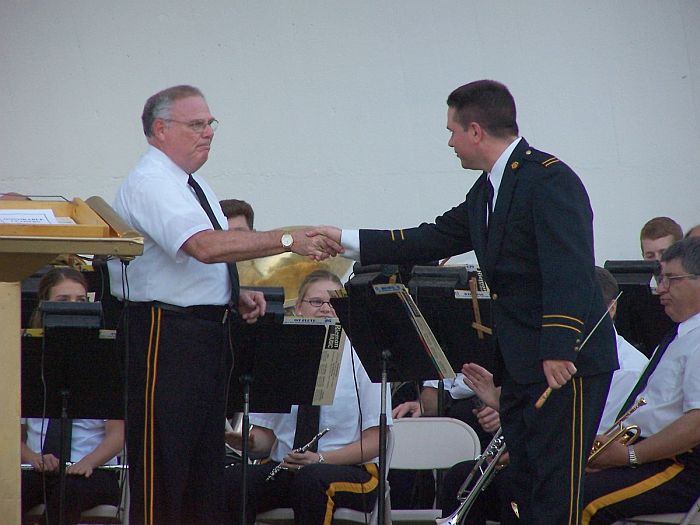
Mr. Glover began writing and arranging for band while a student in
high school, and has more than 150 publications in print. He taught
instrumental music in St. Louis area public and private schools for nine
years. In October, 1998, he joined the C. L. Barnhouse Company of
Oskaloosa, IA., as staff composer, arranger, and editor.
On this concert, the Karl King Band performed his composition, Honorable
Leaders March, his arrangement of Liadovís Dance Of The Amazons,
along with An Autumn Serenade, written by Karl King. In addition,
Mr. Glover conducted a number he brought with him on Sunday. While researching
Karl King music, Andrew had uncovered Salute to the Colors, published
by Theodore Presser and written by Bert Anthony. This energetic march,
arranged by Karl King, had not been heard by present Karl King Band members.
The concert ended with the playing of the Star-spangled Banner by Francis Scott Key.
July 18
Director Jerrold P. Jimmerson and assistant director Keith Altemeier again put together another outstanding hour of band music, with a special emphasis this week on traditional works for Band. Included were Nabucco Overture by the Italian composer Giuseppe Verdi, and Ballet Egyptien, a suite in four sections by Alexandre Luigini.
Lighter music included a tribute to one of Americaís finest movie and television composers, Henry Mancini. This melodic tribute contained the toe-tapping Baby Elephant Walk, and the beautiful Moon River.
Karl L. King compositions comprised a large portion of the program, including his circus marches Sells-Floto Triumphal and Sarasota, the Majestic Galop, the beautiful aerial waltz, Desdemona, and his The Trombone King March.
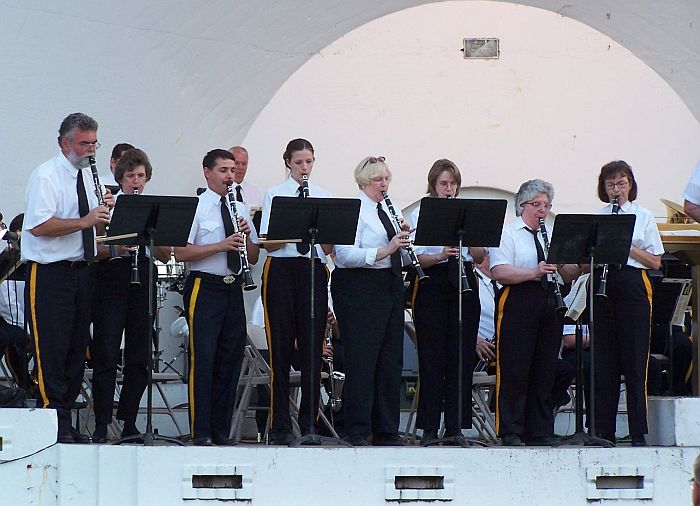
download a video excerpt of Clarinet Candy (7.7 MB .mov)
Other selections included the exciting Spanish march, Amparito Roca, and Vincent Youmanís musical showstopper, Hallelujah! from Hit The Deck. Finally, the clarinet section of the King Band performed a special feature, Leroy Andersonís delightful Clarinet Candy.
July 25
The Karl L. King Municipal Band of Fort Dodge closed their 2004 summer season at the Karl L. King Bandshell in Oleson Park with their final concert on July 25 .
Karl L. King compositions highlighted the evening, with favorites as L. S. U. Tiger Triumph March, Homestretch Galop, and the beautiful aerial waltz, Alpine Sunset on the program. In addition, the band played Man of the Hour march by Henry Fillmore, and Olympia Hippodrome march by Russell Alexander.
Other selections on the program were the classic overture, Morning, Noon, and Night in Vienna, by the Austrian composer, Franz von Suppe, along with the Procession Of The Sardar from Caucasian Sketches by the Russian composer, Ippolitov-Ivanov.
Lighter sounds included Beguine For Band by Glenn Osser, and Leroy Andersonís Sandpaper Ballet, featuring the members of the bandís Percussion section.
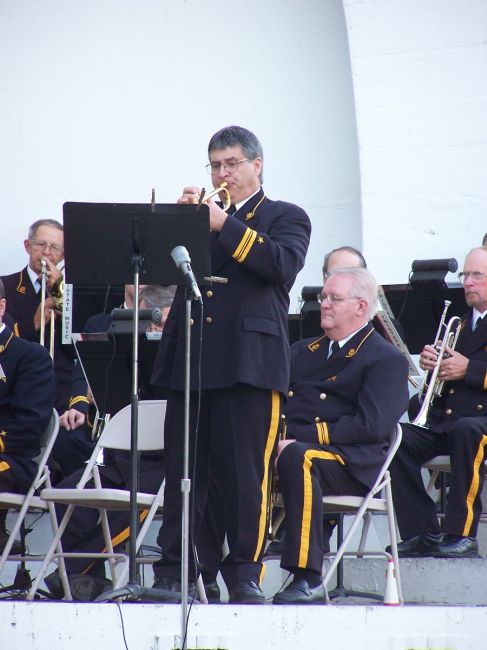
Jim Perkins, who plays Solo Trumpet in the King Band, was the featured soloist for the evening. Jim attended St. Cloud State University in Minnesota, where he earned a B. S. degree in Music Education and his M. S. degree in Information Media. He has performed over 500 concerts with Community Bands and Orchestras in South Dakota, Minnesota, and Iowa. Currently, he is the Principal Trumpet with the Central Iowa Symphony and the Central Iowa Brass Quintet, both located in Ames. He has played with the King Band for the past 7 seasons, and currently works as the school librarian at the Urbandale Middle School, near Des Moines. Mr. Perkins performed a traditional trumpet solo by John Morrissey entitled Soliloquy For Trumpet along with Hoagy Carmichaelís popular standard, Stardust.
The band closed their 2004 summer season in the traditional way, by playing Auld Lang Syne March by Karl L. King, followed by our National Anthem, The Star-Spangled Banner.
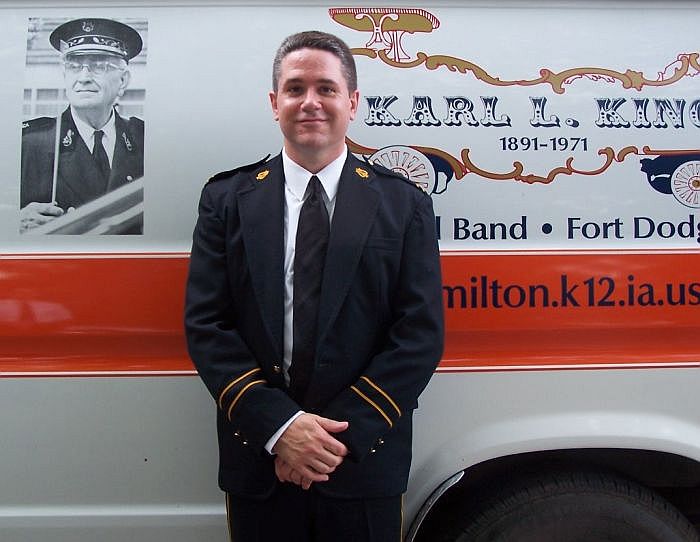
| the Karl King Website | the Karl King Page | Online Photo Archive |